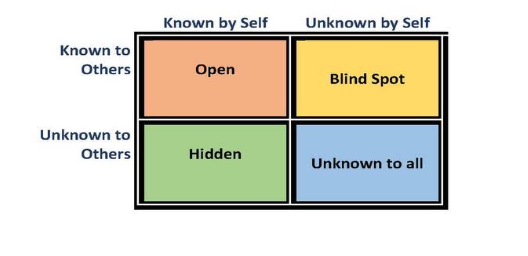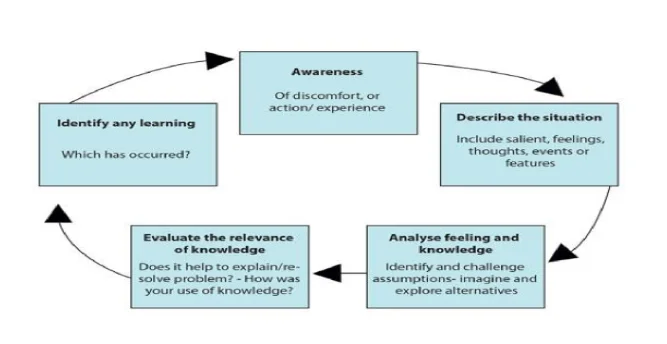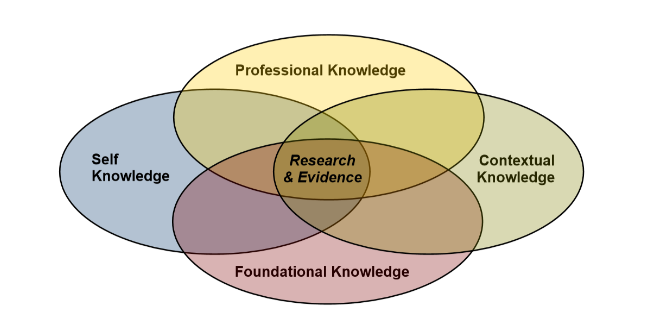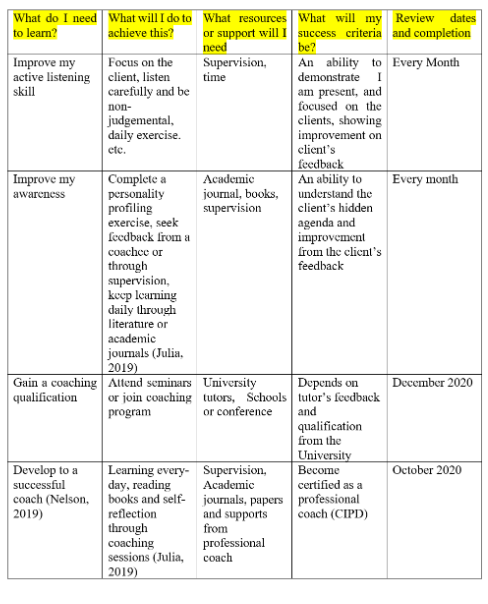Exploring the Foundations of Effective Life Coaching
Introduction
Life coaching is effective for improving skill and capabilities and in this regard there are various literature sources which enhance the activities of life coaching. According to Nelson-Jones (2007, p.9), “life coaching is helpful to recover and maintain mental skill and communication skill, where the coach is paying crucial role in leading the life coaching activities to be more a productive way for enhancing the capabilities of the individuals”. Moreover, Nelson-Jones (2007, p.10) stated that, living coaching is helpful for enhancing the capabilities of self-coaching, where the coach is efficient to help the coachees to raise awareness and gather in depth knowledge and skill. Coaching is hereby beneficial to develop self-learning activities and it empowers the coachees to improve the ability to handle the course work, create channel and ultimately master the emotional energy towards the outcomes that they want to achieve (Gribben, 2016). Moreover, in order to maximise the potential of the coaching activities, it is necesse3ry to design life coaching (ICF, 2014). In this regard, the coaches act boldly to represent the information and data (Hargrove, 2008), as well as unlocking the potential of the person (Whitmore, 2004), enhancing the potential and brilliance of the coaches so that the client can set better gaols (CoachVille.com, 2003). As discussed above, life coaching is sometimes critical in mentoring, but it is different from mentoring because a life coach provides the powers to the coachee for getting their life under control by addressing their incompetence, immaturity, or poor knowledge and lack of skill (Holmes, 2016). The objective of the study is to review the literature sources and analyse the principles that underpin the life coaching practice. Through this study, it is possible to understand the coaching perspective as well as some principles and models which enhance the activities of developing life coaching planning (Martinez, 2016). There are two principles which will be evaluated further and the two principles are such as passionate curiosity regarding the coachee and the person centred, individualise approach and through the discussion. For psychology dissertation help, exploring these principles provides a foundation for understanding effective coaching methodologies.

Describing and analysing the principles
According to Rogers and Farson (1957), in order to improve personality and gather more in depth knowledge, it is necessary to have the skill of active listening. It can positively affect the attitude and behaviour of the coachees and change their perception by gathering new ideas. They can become less defensive and they are willing to be more open and gather experience for maximising their potential. It is also a powerful skill of the coachees which raise their passion and curiosity over a particular subject (Rogers & Farson, 1957). The skill with passionate curiosity about the coachees is always associated to each other when structuring a good coaching session and it further provides a scope to the coachee to achieve their desired goals. Life coaches show an interest in their coaching client, which involve considering all the clients and needs, trust their institutions and the skills of awareness, body language and environment are also playing crucial role for making the coaching session successful (Irwin & Morrow, 2005; Newnham-Kanas et al., 2010).
Passionate curiosity is considered to be effective situation, where the individual can learn more through being passionate and increasing curiosity. As Albert Einstein said, “I have no special talents; I am only passionately curious”, the passionate curiosity is effective to reveal the hidden aspect of the problem. The passion for anything further enhances the interest of the individuals and it further helps to solve the problems happily (Elsey, 2019). Curiosity does not mean to have better experience on that particular topic and trained, the people may have curiosity out of their interest and the willingness to gain more knowledge and skill. The coach can identify the hidden potential and areas to raise awareness among the coachees and it would be beneficial for the coach to learn more through enhancing passionate curiosity among the coachees (Luft & Ingham, 1969). Through active listening and powerful questioning skills, it becomes easy for the coach to identify the hidden areas and potential of the coachees and it further helps the coach to trainee the people efficiently by improving their skill and knowledge in long run (Elsey, 2019). In this regard, Curiosity itself is a driving force which enhances the skill and abilities of the people to solve the problems by creating innovative solutions. Also, according to Tyrell (2019), the life coach gives a planning or the people with trust where the coach is passionate n ambitious t develop appropriate training program for the benefits of the trainees.
Continue your exploration of Pursuing Photography Passion with our related content.

The second principle for life coaching practice is the approach of client centred where individual learning program can be developed. According to Whitworth et al. (2007), every coachee is unique and they focus on different set of goals, requirements, skills, interest and habits. That explained the reasons of the principle which is fundamental, as the aim of the coaching session is to help coachee to achieve their desired goals, the client-centre approach is unique way and tailored to the coachee’s needs and values (Kimsey-House et al., 2011; Pearson et al., 2013; Whitworth et al., 2007). In this context, life coaches are effective to give importance to the coachees and help them to improve their focus for maximising their potential through the learning activities (Francis & Milner, 2006; Williams & Davis, 2007). Moreover, Schneider et al. (2011) opined that, a person centred focus is utilised to motivate the client for creating solution to their problems without giving them advice (Ellis, 1998) and in order to allow the client, it needs full control over the topics and the understanding (Kimey-House et al., 2011; Schneider et al., 2011). Therefore, the client-centred focus and individual approach is a crucial element for coachee’s success.
Conclusion
The evidence suggests that the two principles are interlinked with each other and it is essential for client growth where the coach helps to unlock the potential of the clients by providing client centred approach and influence the coachees to focus on passionate curiosity and it is effective for the clients to understand the coaching process and it is also beneficial for the coach to fulfil the client’s objective to achieve their purpose of attending in life coaching session.
Looking for further insights on Life Span Behaviour And Development? Click here.
Personal coaching development commentary through reflection and analysis
During coaching records and learning log (2019) and 15 hours of my coaching session, I have struggled to identify the hidden agenda of the coaching client A5 and B5. The client A5 declared that, the coach did not understand the personalise problem of him and the coach was unsure about the needs and values of him. Thus he was not feeling valued in the coaching session and he was not able to fulfil his preferences. Due to lack of awareness of understanding the client’s perception, it becomes difficult for the coach to develop appropriate training program of the benefits of the client. As per the feedback of B5, she explained that, the coach did not have active listening skill as she required repeating herself many times and the coach was not determined and purposeful to present the information. According to the Gibb’s and Atkins and Murphy’s models of reflection, (Figure 1.2), both the clients A5 and B5 stated that, the coach lack active listening skill and ability for creating awareness. I as a coach aim to identify weaknesses so that it would be possible for me to develop effective strategic planning to raise awareness and influence the coachees to perform better and enhance their learning and developmental activities. On the other hand, the clients also explained that, the coach has right skill and knowledge as well as energetic and non-judgmental which are helpful to achieve future goal. Therefore it is necessary for m to improve active listening skill and creating awareness so that it would be beneficial for m to develop effective learning program of the participants.

Reviewing the personal weakness
According to Rogers and Farson (1957), active listening style of coaching is appropriate way to encourage the people and to change and it has positive impacts on the attitude of the coachees where they can participate in group discussion and change their perceptions on a particular subject matter. Through active listening skill, the people can gather new experience, raise awareness and become less defensive and emotionally matured where they start thinking critically after gathering information through their active listening skill (Rogers & Farson, 1957). Information gathering and facilitating new information are possible through the active listening skill where it raises curiosity about the coaching session and client’s agenda and this in turn helps to explore the hidden areas from the coaches.
In addition to this, the life coaches are possible through the trusting institution and full awareness, where the client’s emption, body language and the internal environment of the place are effective factors contributing in arranging successful coaching (Irwin & Morrow, 2005; Newnham-Kanas et al., 2010). It is related to passionate curiosity and develops other coaching models, which further help to improve active listening (Williams & Davis, 2007). According to Rogers and Farson (1957), the coach can convince the client and change their perspectives. Active listening skill is also effective for developing string relationship between the coach and coachees and this further helps to explore new ideas and it enables to clear their thoughts, potential contribution and feelings (Rogers & Farson, 1957). Different studies from the ICF (2014) revealed that, there are other benefits of active listening such as it enhances the process of underpinning implicit understanding of the underlying framework ad it further allows the coach to focus on the agenda of the coaches and understand their perspectives. In this context, the emption, situation in life and desired outcome can be understood by the coach where it is possible to choose particular agenda for further analysis. Hereby, the behaviour and the skill of the person can be improved through active listening skill.
The other part required to be improved, which is creating-awareness. The competencies of ICF aim at identifying desired outcome through active listening and goal setting (ICF, 2019). However, raising awareness provides a scope to the coach to increase concern by using T-GROW and other models. If one fails to integrate with competency of creating self-awareness, then it will not achieve the coachee’s desired outcomes. The process of creating awareness “to shift coachee’s viewpoints and find new possibilities for action” is a collective process that improves the behaviour of the coach. The study review demonstrates different practice which also creates awareness and the framework is also useful to facilitate the significant process of listening, reflecting, analysing and questioning which results the creation of awareness.
As per the literature review, I am able to review my skill and abilities and I realise that there are two skills, which I need to improve. The two skills are active listening and creating awareness which are effective for the coachees and coach. The coaches are trying to gather client’s feedback as the coaching session is not valuable without proper feedback from the client and in this context, I try to develop appropriate plan for the coachees where I aim to gather the feedback from the client, so that they can share their opinion. The design of the actions and facilitating the goals of the study are effective where the coach is responsible to achieve the goal with proper development of the coaching activities. Active listening skill is hereby beneficial to gather client’s feedback ad influence them to share their perception successfully. On the other hand, the coaches are also trying to raise awareness in order to improve the learning activities where it is possible to improve concern among the coachees and enhance the learning and developmental activities successfully. It is also possible to develop self-directed and self-regulated learning process through increasing awareness among the coachees and it is also easy to manage tracking process and accountability in the life coaching activities. As Grant (2001a) explained that, goal setting activities are also mandatory in developing suitable coaching session where the coaching cycle is planned well with supportive structure and constructive evaluation collected through client’s feedback. After proper evaluation and analysis, it is easy to achieve the ultimate goal of the coaching process and in this regard the coaches are efficient to develop the learning and developmental activities to make the program successful and make it beneficial for the coachees.
Personal and professional development plan as a coach
Experience-based coaching theory (Evered & Selman, 1989; Whitmore, 2002; Whitworth et al., 2007) and empirical studies are effective for organisational learning and it is also effective in the context of business and psychological contexts (Bono et al. , 2004; Creane, 2002; Gale et al., 2002; Grant, 2001b; Hurd, 2002; Joy, 2001; Quick & Macik-Frey, 2004; Wilkins, 2000). Coaching is effective for improving communication and it includes trust, confidentiality and power which in turn help to generate powerful questions and get feedback for more evaluation and analysis. In addition to this, the coaching cycle is beneficial for self motivated and self directed learning where the individual is able to generate self-evaluation and self-monitored learning process with proper accountability and managing responsibility. The development of the problem solving skill is also possible through coaching cycle where the provision of concrete action and practice as well as changing emotion, resistance and self-sabotage aspects are beneficial for effective learning and development of the skills. This includes psychological development, array of disciples, clinical psychology, therapy and management as well as sociology change, leadership and organisational development, adult learning and education (Hurd, 2002; Results Coaching Systems, 2004).
As evidenced above, there are two specific skills which are required for designing the learning ad developmental activities and the skills are creating awareness and active listening. During my coaching journey, this is challenging for me to develop active listening and creating awareness skill. In order to become professional coach, it is necessary for me to develop detail planning for providing personal and professional development planning. the coach needs to develop the skill of creating awareness to reshape the assessment guidance of earning programs and in this context professional knowledge and personal skill are effective to develop the learning programs efficiently (Margison, 2001). In this regard, the coaching related research as well as decision making practice is effective for the coaches to develop clear principles and ensure coaching road mapping o offer effective research and evidences as a dynamic interaction among four knowledge domains for having coaching mastery (Figure 1.3).

As per the above figure, the four domains are
1. Foundational knowledge
2. Professional Knowledge
3. Self-knowledge and
4. Contextual knowledge
In the carrier of coaching, foundation knowledge is effective where the knowledge, model and theories and guidelines are necessary to develop coaching sessions. The professional knowledge can be improved through reviewing the literatures, provided by the scholar and professional and all the peers and coaches are involved in the coaching session to develop effective planning and caching road map. The personal and professional developmental activities are useful to develop self-knowledge, which is about awareness, maturity and wisdom. In this context, I aim to develop my professional coach career and as per the evidence I feel that there is string requirement of improving my active listening skill and the knowledge to create awareness, which is major weakness during my coaching journey.
Additionally, the contextual knowledge is the subject matter of expertise, where the organisational strategies and practice will be evaluated to fulfil the objective of coaching. For professional development, I try to utilise the GROW and SWOT model to identify the change foundation as well as I also aim to compare the present circumstances and identify the way to move forward successfully. In this regard, I also try to identify my weaknesses and improve learning activities so that it would be possible for me to improve self knowledge and coaching skill. Analysing the data from the 360-degree supervision or assessment is also beneficial for further training session and learning opportunities to develop contextual knowledge. hereby, each of the four domains are necessary for successful supervision and where I can influence the participants to provide constructive feedback so that I would be able to highlight the areas of improvement and develop appropriate coaching planning.

Coaching Development Plan

Conclusion
As per my development plan above, it is related to learning. From the literature perspective, learning is a continuous coaching process where it is necessary to have proper intrinsic nature of learning and it is also effective to cover the way to achieve future goals and ensures manifestation of change (Hargrove, 2003; Hurd, 2002; Whitworth et al., 2007; Wilkins, 2000). Hurd revealed that “coaching creates the conditions for learning and behaviour change” (Hurd, 2002, p.124). It describes that coaching is an on-going cycle of deep learning that helps to improve argument for action and education to create change (Whitworth et al., 2007, p.5). Hargrove (2003, p.86) refers to the learning done in coaching as “transformational” rather than “transactional”, where formal and informal as well as experimental based ;learning are necessary for shifting the perspective and challenging the saboteur’, to achieve future success (Moran, 2003; Creane, 2002).
Coaching is learning opportunities to maximise change and promote the learning activities which in turn helps to achieve goal (Skiffington & Zeus, 2003, p.81). Hurd (2002) described that, coaching is “learning for the long haul”; it is “lifelong learning”, where coaching becomes efficient to create active, authentic, collaborative and engaging learning which are good for the coachees. According to Coaching Practice and Drake’s model, the coaching development process is effective to create awareness and provide learning opportunities. Therefore, whether I aim to be a successful coach or get certified as a professional coach, there are a lots of learning and training involved, which further influence me to conduct further education or join seminars and conferences that provided by other coach to gain insight and experience about dealing with different clients and their issues. Hereby, my plan to become a successful coach is a lifelong journey, which needs on-going learning and training for fulfilling my personal and professional goals.
References
Chen, S (2019). Coaching Records and Learning Log.
CoachVille.com. (2003). The coaching starter kit: everything you need to know to launch and expand your coaching practice, New York, NY: WW Norton & Co.
Creane, V.E. (2002). An exploratory study of personal coaching from the client’s perspective. Unpublished doctoral dissertation, California Institute of Integral Studies, San Francisco, USA.
Drake, D.B. (2009). Evidence in action: A relational view of knowledge and mastery in coaching. International Journal of Evidence-Based Coaching and Mentoring, 7(1), 1-12
Ellis, D. (1998). Life coaching: A new career for helping professionals, Rapid City, SD: Breakthrough Enterprises.
Grant, A. M. (2006). An integrative goal-focused approach to executive coaching. In D. R. Stober & A. M. Grant (Eds.), Evidence-based coaching handbook: Putting best practices to work for your clients (pp. 153-192). New York: John Wiley & Sons
Gribben, S. (2016). Key Coaching Models. 1st ed. London: Pearson Education Limited, pp.3.
Hargrove, R. (2003 and 2008) Masterful Coaching (Revised Edition). San Francisco: Jossey-Bass Pfeiffer.
Hurd, J.L. (2002). Learning for Life: A phenomenological investigation into the effect of organisational coaching on individual lives. Unpublished doctoral dissertation, Union Institute and University Graduate College, USA.
Margison, F. (2001). Practice-based evidence in psychotherapy. In C. Mace, S. Moorey & B. Roberts (Eds.), Evidence in the psychological therapies: A critical guide for practitioners (pp. 174-198). London, UK: Brunner-Routledge.
Rogers, C.R., & Farson, R.E. (1957). Active Listening. In Communication in Business Today. Ed. R. G. Newman, M. A. Danziger, & M. Cohen. Washington, D.C.: Heath and Company.
Skiffington, S., & Zeus, P. (2003). Behavioural coaching. Sydney: McGraw Hill.
Williams, P., & Davis D.C. (2007). Therapist as a life coach, an introduction for counsellors and other helping professionals, New York: WW Norton & Co.
Whitmore, J. (2004). Coaching for performance, London: Nicholas Brealey.
Whitmore, J. (2002). Coaching for performance. (3rd ed.). London: Nicholas Brealey Publishing.
Whitworth, L., Kimsey-House, K., Kimsey-House, H., & Sandahl, P. (2007). Co-Active Coaching: New Skills for Coaching People Toward Success in Work and Life (2nd ed.), California: Davies-Black Publishing.
Continue your exploration of Bridging Experience With Academic Aspirations with our related content.
- 24/7 Customer Support
- 100% Customer Satisfaction
- No Privacy Violation
- Quick Services
- Subject Experts



